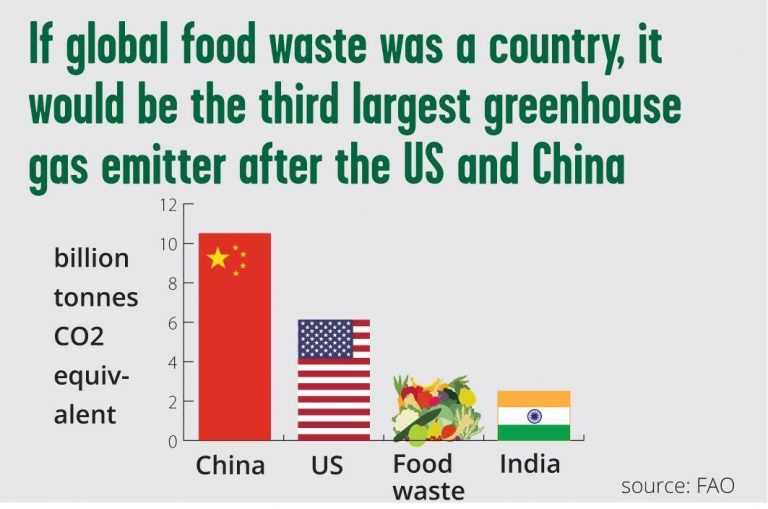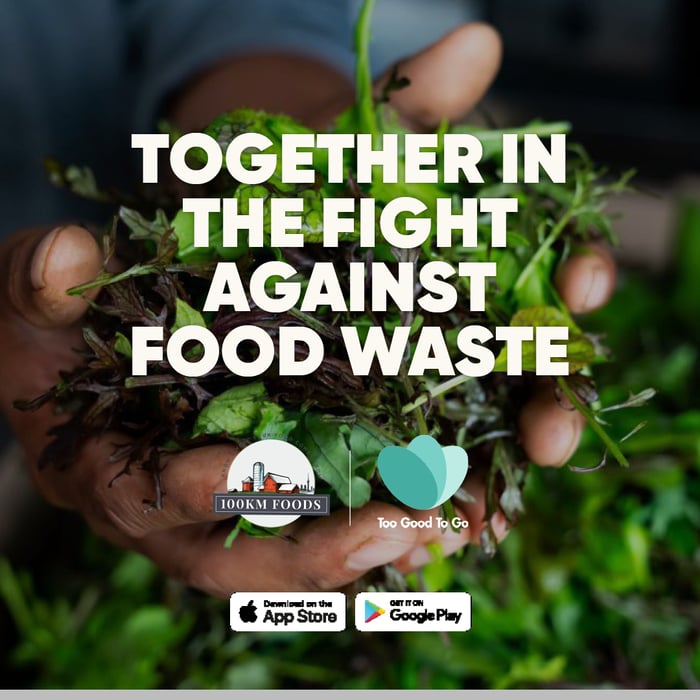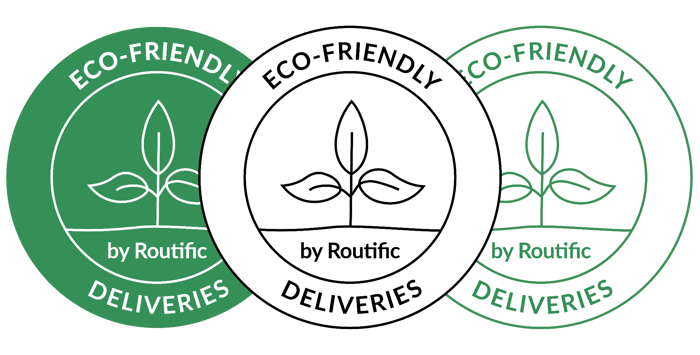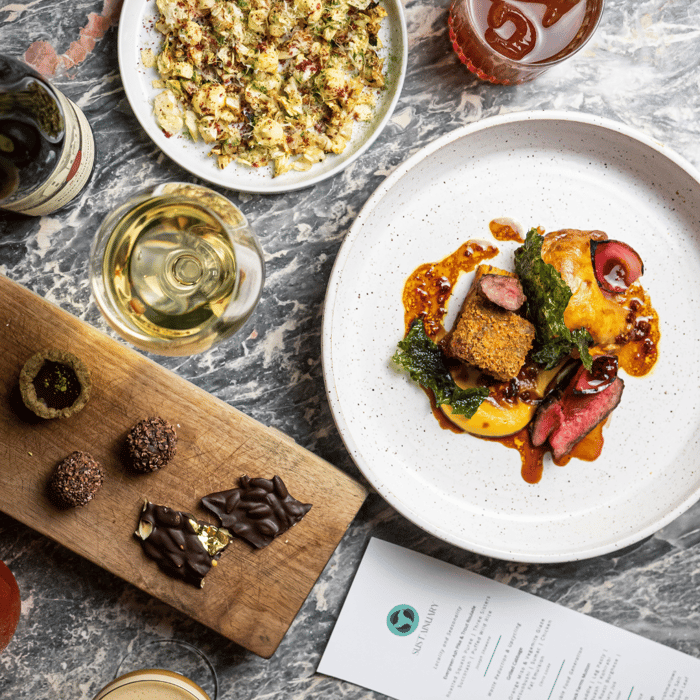Happy Earth Day! Our beautiful planet should be celebrated every day, but Earth Day especially is a day that calls us to action, to do something to help preserve and heal this beautiful planet we call home.
As an agri-business, we feel a deep sense of connectedness with, and responsibility to, the land where we live, raise a family, and do business. We have a vested interest in giving back to the place that sustains us as people, and as an organization, and this is woven into the very fabric of our company.
While there is still more work to be done, we are committed to constantly evolving and implementing innovative ways to help protect our planet through the way we conduct our business including:
- Fighting Food Waste
- Reducing Our Packaging
- Minimizing Our Kilometres Travelled
- Prioritizing Partnerships With Local & Sustainability-Minded Businesses
- Being a Certified B Corporation
- Co-Founding Sustainuary
Click on the links above to jump directly to each section to learn more. We've also compiled a list of resources at the end of this blog post for ways to get involved in Earth Day this weekend in the city and how to find Earth Day events in your area!
Fighting Food Waste
As members of the food industry, we know that this industry as a whole is notorious for waste. If food waste were a country, it would be the third largest contributor to greenhouse gas emissions. And yet, a third of all food grown in the world ends up going to waste.

Curbing food waste is a communal effort and we've seen our restaurant partners come up with creative and innovative ways to reduce food waste in their restaurants. But before this food reaches your kitchens, it passes through our warehouse and luckily there are incredible organizations that we partner with that help us minimize the amount of food that passes through our warehouse that goes to waste before reaching you.
Too Good to Go Canada
Perhaps you've heard about our partnership with Too Good to Go? A fellow Certified B Corporation, this innovative organization redirects our surplus of local foods to the app to sell to individual consumers at a discounted priced. Every Thursday, we list our "surprise" bags on the Too Good to Go App for pick-up at our warehouse on Fridays.

Since Too Good to Go's Canadian launch in July of 2021, they've saved over 300,000 meals across their network of household, business, and school partners - this is equals to the YEARLY CO2e emissions of 47 Canadians! We're extremely proud to partner with them to be a part of this contribution.
Don't have the app yet? Download Too Good to Go here!
Donating Short-Dated Items to The Stop Community Food Centre
As a food distributor, we frequently have a surplus of perfectly good products that are simply too close to the expiring date to sell for resale or for restaurant use. Instead of this food going to waste, we donate these items to The Stop Community Food Centre who then transform these amazing local products into nutritious, wholesome, delicious meals for low-income Torontonians in spaces that are warm, dignified, and respectful.
Reducing Food Packaging
This piece is something we didn't have to worry too much about when we were exclusively distributing wholesale! A lot of our wholesale products came with minimal packaging in wholesale formats.
However, once we entered the home delivery world, we noticed very quickly what a tremendous challenge food waste and packaging can be. Finding the balance between preserving the quality and integrity of the products we sell while also following food safety best practices, keeping packaging at a minimum and factoring in the associated financial costs of retail packaging...needless to say it has been a huge a learning experience!
But, we are very proud of the improvements we've made over the last year in minimizing plastic and unnecessary packaging. We also have a "take back" program for our freezer bags and ice packs that can be returned where they will be sanitized and reused.
We also have a number of farmers and producers who go above and beyond to make their packaging environmentally friendly. Sometimes, what may look like plastic packaging, isn't actually plastic at all! For example, our friends at Elmira's Own use baskets and trays made of wood pulp that can decompose naturally in your backyard to package their tomatoes instead of plastic trays. The film they use to wrap their product in is also made of cellulose derived from wood pulp. This gets heat sealed and helps retain the shelf life of the product and is 100% compostable!
Minimizing Our Kilometres Travelled
Although 100km Foods' kilometres travelled is nothing when compared to transportation of food in the global supply chain, it is not lost on us that driving around Southern Ontario in diesel trucks is not the most environmentally friendly option.
We've researched switching to alternative fuel use, or purchasing electric vehicles, but until those are manufactured more cost-effectively, they are not economically feasible (for reference, a single electric truck similar to those in our fleet currently costs approximately $400,000). The margins in our business simply do not make this expenditure possible.
So all we can do is try to ensure that the routes that our trucks take when on the roads are the most efficient routes possible to keep our kilometres travelled to an absolute minimum. To help with this, we use a routing app called Routific to optimize our wholesale and retail deliveries.
In 2021 alone, Routific helped over 1,400 businesses save about 90,000kms of travel, equivalent to planting just over 2.3m trees!

Prioritizing Partnerships With Sustainability-Minded Businesses
Regenerative Agriculture
You've probably heard us talk about regenerative agriculture a lot...and that's because it's importance in reversing climate change cannot be overstated.
At 100km Foods, we are lucky enough to partner with some amazingly innovative and proactive farmers, who recognize the climate crisis and the role agriculture has in it.
Regenerative agriculture takes sustainable practices one step beyond reducing CO2 emissions to reversing them. Farmers who integrate a series of organic farming principals that embody a holistic systems approach on their land can not only reduce their carbon emissions, but also sequester excess carbon from our atmosphere within their soil.
.png?width=700&name=The%20New%20Farm%20(1).png)
Through agriculture, we have the power to reverse the effects of climate change through wide-spread implementation of regenerative agricultural practices. Our farm partners at The New Farm are leading the charge on transforming the way agriculture is done in Ontario and some of our other partners like VG Meats and Harley Farms have also implemented regenerative agricultural practices on their farms.
This is the kind of food system 100km Foods is proud to take part in building and these types of sustainability-minded businesses are who 100km Foods prioritizes when vetting new producer partnerships.
Food Upcycling
Upcycling refers to the process of transforming by-products that typically would go to waste, into something new of higher value. We are seeing more and more innovative businesses coming up with creative ways to divert by-products of food and beverage production from landfills into repurposed products for us to enjoy.
The Spent Goods Company is an example of such business. Spent Goods specializes in diverting spent barley grains, a by-product of beer production, from landfills to bakeries to be used to make delicious breads.

Each year, approximately 16 million kilograms of brewery grains are landfilled in Ontario alone, contributing to greenhouse gas emissions. By diverting these grains from landfills back into food production, Spent Goods is not only reducing greenhouse gas emissions and offsetting carbon, but they're also nourishing our local communities and creating local jobs.
These upcycled bread products, which are available on The Market, are insanely delicious. If we didn't tell you they were made with spent barley grains from local craft breweries, you probably wouldn't have known! We've just added these products to our Retail Ready wholesale offering.
Being a Certified B Corporation
100km Foods is a proud Certified B Corporation. B Corps are accelerating a global culture shift to redefine success in business and build a more inclusive and sustainable economy.
To certify as a B Corp, a company must achieve a minimum verified score of 80 points on the B Impact Assessment. The B Impact Assessment is a yearly assessment that 100km Foods completes that asks questions about how the day-to-day operations of our company create positive impact in a number of specific "impact areas". These include:
- Governance
- Community
- Workers
- Environment
- Customers
We've written a whole blog post dedicated to sharing more details about the specifics that go into B Corp certification and why this matters if you want to learn more!

Co-Founding Sustainuary
We were so proud to have partnered with Chris Locke, Executive Chef of Marben Restaurant to launch Sustainuary this past February. Sustainuary is a public awareness campaign designed to educate on the ways in which a sustainable diet can be achieved and influence change in our food systems by changing consumer demand.
Throughout the month of February, we hosted educational discussions with several of our producer partners in the conversation of sustainability including The New Farm, Sheldon Creek Dairy, Fogo Island Fish and VG Meats.
Each talk addressed one of the key issues in the Sustainuary Framework and offered an opportunity to learn more about how our food systems can be sustainably stewarded. These key issues are:
- Locality & Seasonality: Sourcing ingredients locally and the reduced impact on the environment of doing so while actively cultivating relationships with local growers/producers and building a network of sustainable, like-minded people to source from.
- Social Justice: Advocating for social and political change to allow access to good and culturally relevant food for all.
- Waste Reduction: The encouragement of root to flower and nose to tail eating with emphasis on using the whole ingredient. Upcycling leftovers into new dishes and showcasing fermentation as a vehicle for upcycling.
- Responsible Food Generation & Consumption: Generating food while having a neutral/positive impact on the earth and communities. This includes the way food is grown but also extends to the catching and hunting of wild animals.
Big thank you to our chef ambassadors and restaurant partners who helped spread the message through featured dishes a dinner series, which educated and challenged guests while raising funds for FoodShare Toronto and the work they do around social justice and security in food systems.

We're so excited to continue our Sustainuary campaign next January and make it even more impactful.
Take Action In The City This Earth Day!
These are many ways that we as business can do to be better for our planet, but there are so many things that we can do as individuals to get involved! We encourage you to take action this weekend and do something in your community to help our planet.
Whether it's working in your backyard garden, tree planting, conserving your water and electricity, ditching your car for your bike, cutting down on your waste, volunteering your time by taking part in a community clean-up, or eating at your favourite local and sustainably-minded restaurant — there are so many ways that you can get involved!
Urban Gardening Tips
Whether you have a backyard and are planning a full garden, or just have a balcony space for a few flower and herb planters, you're still providing shelter and nourishment to pollinating insects that are essential to a healthy ecosystem!
Check out this helpful article for urban gardening tips to help you plan and work with the space you have!
Tree Planting Events In Toronto This Weekend
Check out this City of Toronto Planting & Stewardship Events Calendar for all the tree planting events happening around the city this weekend!
Tips For Conserving Water & Electricity
Little changes make a big difference! Check out this article for 48 small changes you can make in your home to reduce your water and energy use.
Toronto Bike Share
It's supposed to be a gorgeous weekend this weekend so ditch the car and find the nearest Toronto Bike Share dock near you!
Community Clean-Ups & Earth Day Happening in Toronto This Weekend
Nothing beats getting outside with like-minded people to do something together. Check out Clean Toronto Together and Earth Day Events to find community clean-ups in your area taking place this Saturday and Sunday.
Support Your Favourite Sustainable-Minded Restaurant
There are so many restaurants in Toronto and the GTA that are doing truly incredible things in their restaurants to help make the world a greener place. Here are (just a few!) of the restaurants we work with who are going the extra mile when it comes to sustainability efforts.
- Avling Brewery in Leslieville boasts a truly spectacular 4,000 square foot rooftop garden where they grow herbs and vegetables that they incorporate into their seasonal menus! From this farm to their brewery to their kitchen, to their partnership, Avling is demonstrating their commitment to sustainability in every aspect of their business.
- Richmond Station: Located in the financial district at 1 Richmond Street, Richmond Station is another restaurant that takes the concept of "farm-to-table" cooking to another level. Richmond Station has their own garden at The New Farm where they grow organic vegetables for their seasonal menus and prioritize working with local farms and producers who prioritize regenerative and organic methods. They are also well known for their whole animal butchery, ensuring no part of the animal goes to waste.
- White Lily Diner: Located on Queen Street East, White Lily Diner follows a simple food philosophy: buy the best of what our region has to offer. In the last couple of years, they've taken this one step farther by starting their own farm, White Lily Farms, that supplies their diner, and locals in their community, with farm-fresh organic vegetables.
- Restaurant at Pearl Morissette: Located in Jordan Station, The Restaurant at Pearl Morissette is a site to behold. Nestled in the Niagara region, this ambitious fine dining experience, features an ever-changing menu of regional ingredients grown in their regenerative and organic farm on site or sourced from a small selection of local farms.
- Marben Restaurant: Located in the heart of downtown Toronto at 488 Wellington, Marben is blazing a pathway of sustainability through their locally focused, farm-to-table menu and innovative upcycling and waste reduction through zero-waste cooking and in-house fermentation.
- Farmhouse Tavern: A Junction Triangle neighbourhood bistro restaurant serving food straight off the farm, Farmhouse Tavern works with a number of local farms within 100km of their restaurant. They also have a weekly F*ck Mondays special on Sundays where they offer 1/2 price food and drink specials to help clear out any remaining food from the week to minimize waste. They also work with Suppli, an innovative rinse, return, and reuse takeout container.
- Burdock Brewery: Urban beekeeping has been touted as a way to boost pollination and improve sustainability, food security and biodiversity in cities. Burdock Brewery in the Bloor West Village is helping save the bees with their two urban bee hives on their rooves.
- Dailo: Dailo, Toronto's College Street Asian hot-spot also has a rooftop beehive, contributing to the biodiversity of our city!


